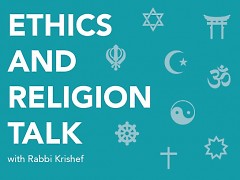Many people don’t realize that approximately 25% of pregnancies end in miscarriage. Most, however, take place in the first trimester. Second trimester miscarriages are much less common. My heart and the hearts of the Ethics and Religion Talk panel go out to this set of parents and all parents who experience the heartache of pregnancy loss. May God comfort all who mourn the loss of their child and all of the hopes and dreams that infused the pregnancy.
To remind you, here is last week’s question:
Two days ago, my wife, who was 17 weeks pregnant, learned through a routine exam that our unborn baby had died. We also learned that she still needs to endure the process of labor and delivery. We are still in mourning and quite sad, yet also continually grateful for our other three children and grateful for the kindness and compassion of our family, friends, and caregivers. My wife and I are now pondering questions of what happens after delivery, how to honor the short life of our child, the question of burial or cremation. How might we properly honor and care for the deceased when the deceased is an unborn child. Is there anything that a faith tradition would encourage us towards? Is there anything a faith tradition would forbid us to do?
R. Scot Miller, who writes from an Anabaptist and Quaker Christian perspective, responds:
May you find meaning in your suffering, and may you rejoice if you find solace and are able to receive mercy. My wife has experienced two such losses (miscarriage) and close friends of mine have experienced stillbirth. In both cases, it was our very particular faith that gave meaning to death. Our close friends were able to have a private ceremony, just their family, and honor the stillborn child with a burial that suited them.
If you are not part of a faith community to help you give meaning to loss of life, you certainly are free to seek and give meaning as children of a source of power, love, and knowledge that expands the ways in which you survive loss. In my life, it has been the power of the God of Abraham and Sarah that I know specifically through Jesus the Christ., who takes away the sting of death. It is not necessary for you to accept my faith, or anyone else’s, to give meaning and honor to the power of both life and death. I wish you well in your exploration, and ask that you not consider what other faith traditions would forbid you to do, unless you are considering them as your primary source of knowing related to deity. This is a time for your family to find support in love for one another, and from those you choose to invite to share your suffering and perhaps, your joy of greater understanding. God’s peace to you in whatever you do, as God will know and bless your intentions.
Fred Wooden, the senior pastor of Fountain Street Church, responds:
Thirty four years ago this story was us, my wife and me. She was 27 weeks pregnant, and also delivered him as any other baby. First, let me say we still hold that son close to us and cherish his brief presence in our lives. And as a clergyperson I asked the same questions you did, for this is not something religions devote much attention to.
Because he was nearly at term, we met our son in the delivery room and spent time with him. That he was dead did not rob him of having lived, which was made real by being with him. We thought of our ancestors who had lost children, for whom childbirth was far more uncertain and realized we had received a gift of wisdom through in his death.
Now, your loss happened far earlier than ours and seeing your child may be less useful. I urge you, insofar as you can though, to treat your child as a living person who died. She or he was part of your life. If possible, bury your child in some way. It shows care and dignity and gives you a time and place to remember as the years pass. If you are part of a faith community ask your clergyperson to create a service of some kind. If grandparents or siblings wish to attend, let them. Dr. Suess guided us, believe it or not, and can guide you, too - ‘A person's a person, no matter how small.’ He or she was your person.
This column answers questions of Ethics and Religion by submitting them to a multi-faith panel of spiritual leaders in the Grand Rapids area. We’d love to hear about the ordinary ethical questions that come up on the course of your day as well as any questions of religion that you’ve wondered about. Tell us how you resolved an ethical dilemma and see how members of the Ethics and Religion Talk panel would have handled the same situation. Please send your questions to [email protected].
The Rapidian, a program of the 501(c)3 nonprofit Community Media Center, relies on the community’s support to help cover the cost of training reporters and publishing content.
We need your help.
If each of our readers and content creators who values this community platform help support its creation and maintenance, The Rapidian can continue to educate and facilitate a conversation around issues for years to come.
Please support The Rapidian and make a contribution today.
